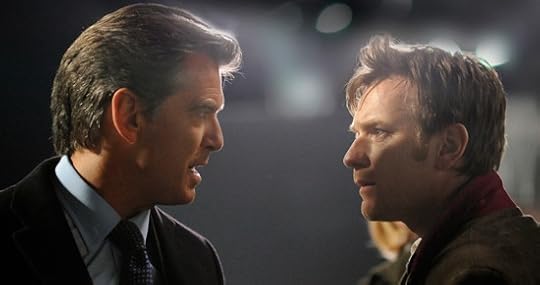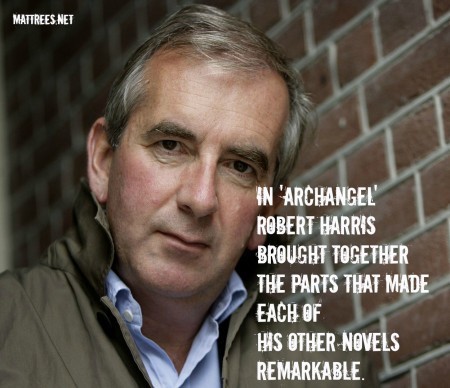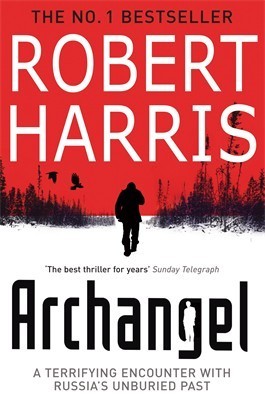Matt Rees's Blog - Posts Tagged "archangel"
My voice and his voice: first- or third-person narrative in the novel
 Robert Harris has been one of my favorite authors since I first laid hands on “Fatherland,” his “what if the Nazis had won” thriller. “Enigma” and “Archangel” were even better. His first two Roman ventures “Pompei” and “Imperium” were by no means the worst books I read in the years of their publication.
Robert Harris has been one of my favorite authors since I first laid hands on “Fatherland,” his “what if the Nazis had won” thriller. “Enigma” and “Archangel” were even better. His first two Roman ventures “Pompei” and “Imperium” were by no means the worst books I read in the years of their publication.Then came “The Ghost.” The story of a hack writer hired to ghost the memoirs of a former British Prime Minister — transparently Tony Blair — was diminished by two things. First, Harris clearly dislikes Blair’s political decisions so much he lost some of the power of empathy that had been important in his earlier books. Second, it was one of those times when the first person narrator simply didn’t work.
Now that the novel has been made into a movie – with Harris co-writing the script with Roman Polanski – the “I” has been dropped. Significantly, the story now works much better. What is it about the change of voice that completely shifted the emphasis of the book, and improved the storytelling?
Voice – “my” voice or “his” voice – is a key element in writing a novel. “I” can give you something quirky or, more significantly, immediacy. “His” gives you detachment.
Harris wanted his narrator to be increasingly compelled, against his better instincts, to investigate something seedy he appeared to be uncovering about the former Prime Minister as he worked on the memoirs with him. In fact, it robbed him of detachment and left the narrative cluttered with the kind of outrage about Iraq and terrorist rendition the Ghostwriter probably wouldn’t have felt – but which Harris clearly did.
By taking the story out of the first person, Polanski and Harris avoided the internal outrage. Instead, they made the unnamed Ghostwriter’s actions almost entirely the result of external events. Only once or twice does he make a choice that takes him deeper into the action – to call a political foe of the Prime Minister whose phone number he finds in a dead man’s effects, for example. That’s far less than in the novel, where he’s constantly talking himself into doing something we all know he shouldn’t…and which a man being paid a quarter of a million pounds for a month’s ghostwriting surely would avoid.
There’s an alternative to the immediacy of “I” and the all-knowing narrator of the Victorian novel, however. Think of point of view. Each chapter – even the entire novel – should be from the point of view of particular character. That way you get the immediacy of first person without sacrificing the detachment of third person. (Third person also gives you more descriptive power as you can use language that might seem verbose in the mouth of your character.)
In other words, stay “with” a single character. See only what he sees. From time to time, let us into his head with a “he thought.” But don’t stay inside that head and, by the same token, don’t switch heads from paragraph to paragraph. Let things happen to the character without the reader seeing it entirely through the character’s eyes.
That’s what Polanski has Harris do in the movie “The Ghost Writer.” Ewan McGregor, who plays the Ghostwriter, is in almost every scene. We see everything unfold from his point of view. We just don’t have to follow every trivial thought or angry impulse. And we end up with a lot more sympathy for the former Prime Minister.
It might seem less hard-hitting as political commentary. But it’s a much better story.
Published on April 23, 2010 03:10
•
Tags:
archangel, crime-fiction, enigma, ewan-mcgregor, fatherland, imperium, pompei, robert-harris, roman-polanski, the-ghost, the-ghost-writer, thrillers, tony-blair, writing
If you read only one Robert Harris thriller, read Archangel
The story of a Stalin bloodline is truly chilling
 What? Not Enigma? Not The Ghost? Right, not Enigma. Definitely not The Ghost. In Archangel, Robert Harris brought together the parts that have made each of his other novels in some way remarkable. There’s a historical What-if mystery, an erudite figure at the center of the book, and a chilling final section filled with tension.
What? Not Enigma? Not The Ghost? Right, not Enigma. Definitely not The Ghost. In Archangel, Robert Harris brought together the parts that have made each of his other novels in some way remarkable. There’s a historical What-if mystery, an erudite figure at the center of the book, and a chilling final section filled with tension.
 A British historian travels to Russia for a conference. There he learns of the existence of Stalin’s secret diary. He tracks it to the northern city of Archangel, where he makes a terrifying discovery.
A British historian travels to Russia for a conference. There he learns of the existence of Stalin’s secret diary. He tracks it to the northern city of Archangel, where he makes a terrifying discovery.
Without giving the end away, I must tell you that the conclusion of the novel is particularly poignant in these days of Ukrainian troubles and a new kind of Stalin in the Kremlin yearning for the good old days of the Soviet Union. Even more reason to read this one.

Read more If you read only one... To discover the indispensable book by each big thriller writer.
Get a FREE ebook of my crime stories.
 What? Not Enigma? Not The Ghost? Right, not Enigma. Definitely not The Ghost. In Archangel, Robert Harris brought together the parts that have made each of his other novels in some way remarkable. There’s a historical What-if mystery, an erudite figure at the center of the book, and a chilling final section filled with tension.
What? Not Enigma? Not The Ghost? Right, not Enigma. Definitely not The Ghost. In Archangel, Robert Harris brought together the parts that have made each of his other novels in some way remarkable. There’s a historical What-if mystery, an erudite figure at the center of the book, and a chilling final section filled with tension. A British historian travels to Russia for a conference. There he learns of the existence of Stalin’s secret diary. He tracks it to the northern city of Archangel, where he makes a terrifying discovery.
A British historian travels to Russia for a conference. There he learns of the existence of Stalin’s secret diary. He tracks it to the northern city of Archangel, where he makes a terrifying discovery.Without giving the end away, I must tell you that the conclusion of the novel is particularly poignant in these days of Ukrainian troubles and a new kind of Stalin in the Kremlin yearning for the good old days of the Soviet Union. Even more reason to read this one.

Read more If you read only one... To discover the indispensable book by each big thriller writer.
Get a FREE ebook of my crime stories.
Published on March 31, 2014 01:25
•
Tags:
archangel, crime-fiction, crimea, robert-harris, soviet-union, thrillers, ukraine, writing



